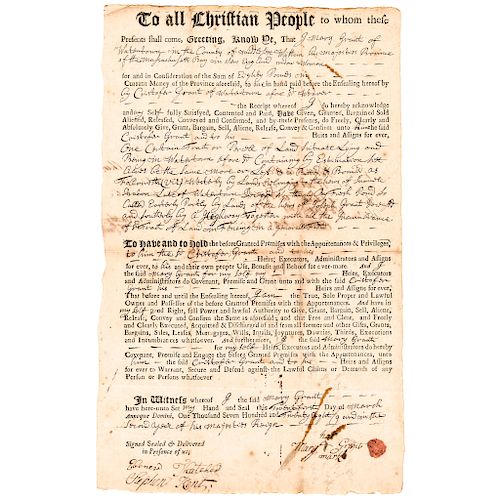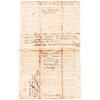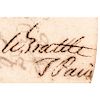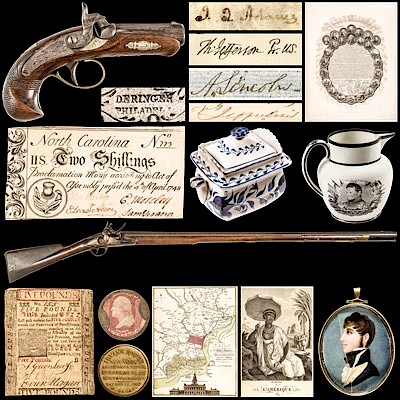1728 General WILLIAM BRATTLE Signed Land Sale Document as Justice of the Peace
Lot 15
Categories
Estimate:
$500 - $600
Absentee vs Live bid
Two ways to bid:
- Leave a max absentee bid and the platform will bid on your behalf up to your maximum bid during the live auction.
- Bid live during the auction and your bids will be submitted real-time to the auctioneer.
Bid Increments
| Price | Bid Increment |
|---|---|
| $0 | $10 |
| $200 | $20 |
| $300 | $25 |
| $500 | $50 |
| $1,000 | $100 |
| $2,000 | $200 |
| $3,000 | $250 |
| $5,000 | $500 |
| $10,000 | $1,000 |
| $20,000 | $2,000 |
| $30,000 | $2,500 |
| $50,000 | $5,000 |
| $100,000 | $10,000 |
| $200,000 | $20,000 |
| $300,000 | $25,000 |
| $500,000 | $50,000 |
About Auction
By Early American History Auctions
Oct 19, 2019
Set Reminder
2019-10-19 12:00:00
2019-10-19 12:00:00
America/New_York
Bidsquare
Bidsquare : Historic Autographs-Currency-Political-Americana-Militaria-Guns
https://www.bidsquare.com/auctions/early-american-history-auctions/historic-autographs-currency-political-americana-militaria-guns-4513
326 Lots of Rare, Historic Autographs, Americana, Civil War Era, George Washington, Abraham Lincoln, Black History, Revolutionary War Era, Colonial America, Federal Period, War of 1812, Colonial Currency, Indian Peace Medals & more... Early American History Auctions auctions@earlyamerican.com
326 Lots of Rare, Historic Autographs, Americana, Civil War Era, George Washington, Abraham Lincoln, Black History, Revolutionary War Era, Colonial America, Federal Period, War of 1812, Colonial Currency, Indian Peace Medals & more... Early American History Auctions auctions@earlyamerican.com
- Lot Description
Autographs
1728 Major General William Brattle Signed Document
WILLIAM BRATTLE (1706-1776). Lawyer, French & Indian War Soldier, Physician, Member of the Ancient and Honorable Artillery Company, and politician of Colonial Massachusetts. During the American Revolution, he was Major General of the Loyalist Royal Militia and played a role in the "Powder Alarm". He was known as "the wealthiest man" in Massachusetts
March 21st, 1728-Dated, Partly-Printed Document Signed, "W. Brattle" as Justice of the Peace on the verso at center right, at Watertown (Mass.), Very Fine. Nicely printed whole and complete being a land sale, where Mary Grant has sold to Christopher Grant a plot of land in Watertown. Signed at bottom by Mary Grant "X" Her Mark, Ebenezer Thatcher, Stephen Kent and on back by noted as executed by William Brattle as Justice of the Peace. A rare signature on an early Colonial document. "Brattle Street," which existed from 1694 to 1962, was a major street in Boston, Massachusetts located on the current site of City Hall Plaza, at Government Center which was called the "King's Highway" or "Tory Row" before the American Revolutionary War.
William Brattle (April 18, 1706-October 25, 1776) was a physician, lawyer, soldier, and politician of colonial Massachusetts. During the American Revolution, he was Major General of the Royal Militia and played a role in the Powder Alarm. He was known as "the wealthiest man" in Massachusetts.
In 1722, he graduated from Harvard. His classmates included Richard Saltonstall of the Saltonstall family and William Ellery.He continued his studies for a graduate degree, and was head of the masters class of 1725.
He was a physician,theologian, and an attorney. Brattle was also a legislator and soldier. He preached sermons in the early 1720s, but by 1725 decided that he did not want to continue to pursue the ministry and began to practice medicine, providing treatment over his years in Cambridge to residents and students.[13] He had a private law practice and for many years was an overseer of Harvard.
Friendly with the Sons of Liberty, in 1769 he supported the revolutionary cause, but two years later he became major-general of the Militia of Great Britain in Massachusetts, He was called a "fence straddler" for "simultaneously appeasing patriots while supporting the British." A Loyalist, he had notified the Royal government when people began to prepare for the Revolutionary War by storing arms. In 1772, he had a significant public dispute with John Adams.
Brattle wrote a letter in the autumn of 1774 to the Royal Governor of Massachusetts Bay, Thomas Gage, stating that members of the local militia were building up arms and that he feared that they were going to steal the store of gunpowder from the Charlestown Powder house. The letter was lost on its way to Gage and was found and published in a Boston newspaper. Gage had the powder barrels removed from Charlestown by 300 troops, which was seen as a means of provocation and resulted in the gathering of 4,000 people at the Cambridge Common. This incident, called the Powder Alarm, made the Tories who lived in Cambridge to feel uneasy. Brattle moved to Boston and remained on Castle Island through the siege of Boston.
The Powder Alarm was a major popular reaction to the removal of gunpowder from a magazine by British soldiers under orders from General Thomas Gage, royal governor of the Province of Massachusetts Bay, on September 1, 1774. In response to this action, amid rumors that blood had been shed, alarm spread through the countryside to Connecticut and beyond, and American Patriots sprang into action, fearing that war was at hand. Thousands of militiamen began streaming toward Boston and Cambridge, and mob action forced Loyalists and some government officials to flee to the protection of the British Army.
Although it proved to be a false alarm, the Powder Alarm caused political and military leaders to proceed more carefully in the days ahead, and essentially provided a "dress rehearsal" for the Battles of Lexington and Concord seven and a half months later. Furthermore, actions on both sides to control weaponry, gunpowder, and other military supplies became more contentious, as the British sought to bring military stores more directly under their control, and the Patriot colonists sought to acquire them for their own use.
In the meantime, his house and other abandoned properties of the Tories were occupied by patriots. His house became the headquarters of Thomas Mifflin, the Commissary General. Regular visitors included George Washington, John Adams and Abigail Adams.
Brattle left Boston in April 1776, when the British evacuated the city, after securing the Governor's gun powder.
When Boston was evacuated, he moved to Halifax, Nova Scotia with General Howe in April 1776, and died there on October 25, 1776 of that year.
- Shipping Info
-
Early American provides in-house worldwide shipping. Please contact us directly if you have questions about your specific shipping requirements.
-
- Buyer's Premium



 EUR
EUR CAD
CAD AUD
AUD GBP
GBP MXN
MXN HKD
HKD CNY
CNY MYR
MYR SEK
SEK SGD
SGD CHF
CHF THB
THB













